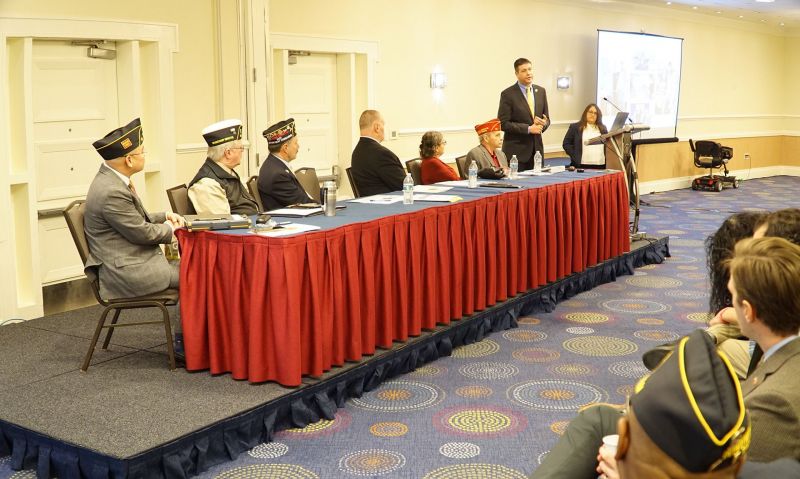
Iraq War combat veteran shares how MDMA saved his life while ending his PTSD
Johnathan M. Lubecky has been through some dark times. Dark enough to attempt to take his own life five times. But thanks to being treated by methylenedioxymethamphetamine (MDMA), Lubecky says those days are behind him.
Lubecky, who now serves as the Veterans & Governmental Affairs Liaison for the Multidisciplinary Association for Psychedelic Studies’ Public Benefit Corporation (MAPS PBC), was part of a presentation on MDMA-assisted treatment for post-traumatic stress disorder (PTSD) delivered to The American Legion’s TBI/PTSD/Suicide Prevention Committee during the organization’s Washington Conference.
MAPS PBC is focused on developing and commercializing prescription psychedelics to bring better treatments to those living with mental health conditions. Lubecky believes the company’s MDMA efforts have saved his life. After first serving in the U.S. Marine Corps in the late 1990s, he enlisted in the U.S. Army in 2003, being medically retired as a sergeant in 2009. His service included deploying to active combat zones in Iraq from 2005 to 2006.
“Within two months of coming back from Iraq, I went to a bar to have a few drinks for Christmas Eve,” Lubecky told the committee. “I heard church bells and realized I should have been there. I went there. They were full and told me to go away.
“So, I went, and I sat on the war memorial in downtown Raleigh (N.C.) and thought of the best ways to kill myself. Something popped in my head, all those briefings we got – ‘Hey, if you start thinking this way, go to the hospital.’ So, I did.”
He didn’t get the help he needed. “I was given six Xanax and told not to take them all at the same time,” Lubecky said. “They asked if I had firearms at home. I said yes. They said I needed to go home at 3 o’clock on Christmas morning and give my firearms to my neighbor, waking them up, and then to come back after the holiday.
“So, I went home, I drank a bottle of vodka, I put a 9-millimeter (pistol) to my temple and I pulled the trigger.”
The first attempt didn’t work, and Lubecky said the second time he pulled the trigger the spring broke. He’s also slit his wrists twice and has been hospitalized.
“After five attempts, hospitalizations, everything, I had an intern slide a piece of paper across the desk and say, ‘Don’t open this until you leave. I’m not supposed to tell you about it.’ It said, “Google MDMA PTSD,’” Lubecky said. “I discovered MEPS was doing a clinical trial. Because two people had dropped out before completing the full trial because they felt healed after one or two sessions, there was enough room for me.”
Lubecky said there is a stigma and reputation with MDMA, also known as ecstasy, “But that’s not what this is,” he said. “We’re talking about medicine that is provided in a clinical environment … a therapeutic environment. Two trained therapists are in the room the whole time.”
Lubecky took his first dose of MDMA in November of 2014. “In 2022 I was healed of PTSD,” he said. “There are not many people on this planet who can say that. One of the biggest lies we were ever told was that PTSD is a permanent condition. Whether it’s MDMA-assisted therapies, regular talk-therapies, other therapies, I am proof that PTSD can be eliminated.”
To amplify his message, Lubecky said he’s pulled a drowning man out of a lake and performed CPR on him for 20 minutes, ran toward gunfire after a shooting in Charleston to try to take out the shooter and then render aid to the victim, and has taken three trips to Ukraine to provide humanitarian assistance during the Russian invasion – including serving along the frontline during battle.
“I knew that the days that I’d lived (before being treated with MDMA) would never come back,” he said. “I still have the memories, and sad things still make me sad. The difference is I decide when I want to think about things. My body doesn’t tell me I have to.
“This is a true game-changer. I know people have said this before in this room to this committee. Please keep an open mind.”
Dr. Berra Yazar-Klosinski, Ph.D., the chief scientific officer of MAPS PBC, has been working on the clinical development of MDMA-assisted therapy since 2009. She told the committee during her clinical trials, her team got an 88 percent treatment response in the MDMA group, compared to around 60 percent in the control group that got pretty good psychotherapy. Two thirds of the participants no longer met clinical criteria for PTSD at the end of the study, compared to one third in the control.
“In addition, depression symptoms decreased. We found a reduction in the risk of alcohol-abuse disorder and a reduction in disorder eating behavior. These were all statistically significant, and that was supportive of the main result. We feel these are coping behaviors that are secondary to the PTSD, and so the fact they also improved was supportive of the primary results.”
Yazar-Klosinski said MAPS PBC has recently met with the Food and Drug Administration (FDA) to go over the components of the MDMA her team is creating.
“We hope we’ll have FDA approval next year, which is very exciting, which will be followed by a scheduling decision within 90 days,” she said. “Pending FDA approval, we hope to launch the product in 2024. We have the potential to treat 1.6 million PTSD patients in the U.S. by 2032, and it’s our desire that veterans are right up there in that timeline.”
